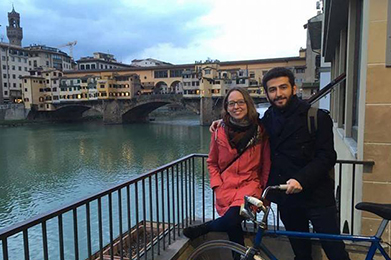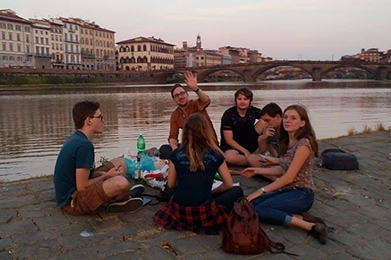As a future teacher of Hungarian as a foreign language, I have been aware of determined, if seemingly unlikely students wanting to learn my amiable but rather difficult first language. However, I wanted to see them with my own eyes. That is why I decided to study abroad for a semester.
I opted for Florence, Italy, on the one hand because I had a basic knowledge of Italian, on the other because I heard the Department of Finno-Ugric Studies at the University of Florence had an excellent reputation in the field. At the end of August 2016, I was ready to embark on a life-changing experience so I set out for Italy alone to live and study there for half a year.


Settling into a new life abroad is certainly not without its difficulties, even if it’s just a temporary stay. Finding accommodation, getting familiar with the culture and speaking a foreign language relentlessly can be challenging, therefore the best plan was to arrive a few weeks before classes start. By September I was happy to report to my beloved ones worrying about me at home that I rented a room with a lovely Neapolitan girl who introduced me to the many facets of Italian cuisine.
Hungarian is often considered an incredibly difficult language, and compared to it Italian seems as easy as ABC. Still, without real-life practice any language can be difficult. Before my stay in Florence I had taken an Italian language course at my home university, Károli Gáspár University in Hungary, which proved to be vital without a doubt. Nevertheless, full-immersion is one of the most effective methods to master a second language. And I had no choice — Italians are too proud of their culture to possibly switch to English even if you are having a communicational crisis. This patriotic mindset of theirs was my great blessing, as it enabled me to truly improve my Italian.
The University of Florence allows students to modify the list of chosen courses within the first few weeks, and this way I was able to take up the ones that interested me the most. The Department of Finno-Ugric Studies lived up to my expectations and during the semester, I took part in a seminar with Italians majoring in either Hungarian or Finnish, where we discussed and compared the literature, language and culture of the three countries involved. As for the requirements, seeing the syllabuses in the beginning it seemed fairly demanding to pass, but at the end exams were totally manageable.
I am very thankful for my home and my host university, as well as for the Campus Mundi program that enabled me to spend an unforgettable semester in Italy. Not only did I come closer to reaching the requirements of my future occupation, but I also learned how to become an independent individual who finds her way in a completely different environment.
Viktória Baum
Copyright © 2023 Károli Gáspár University of the Reformed Church in Hungary. All rights reserved.